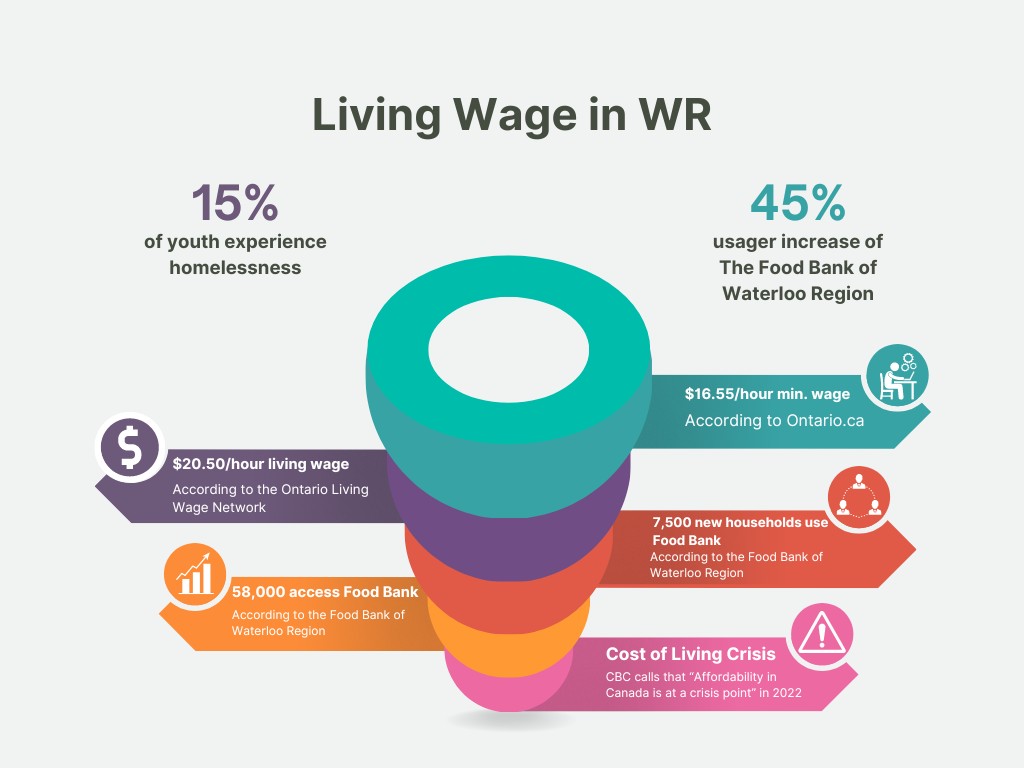According to the Ontario Living Wage Network, Waterloo Region residents ranked third highest in hourly rates at $20.90 an hour. However, many struggle to get by.
Kim Wilhelm, CEO of the Food Bank of Waterloo Region, said food bank usage increased 45 per cent since 2022.
“The Food Bank of Waterloo Region is seeing our highest need in the almost four years that we’ve been in existence and what that looks like is that more than 50,000 people have accessed the Food Assistance Program,” Wilhelm said.
Food insecurity is not an isolated issue—hunger, housing instability and low income go together. The general minimum wage in Ontario is $16.55 an hour from October 2023 to September 2024, an over $4 difference to the living wage rate in Waterloo Region. To someone who makes minimum wage, part time, is about an extra $2,100 for the year. 58,000 people accessed the food assistance prigram over 450,000 times. of this number, 7,500 are new houaeholds who have never accessed a food hamper program before.
The living wage rate calculated by the Ontario Living Wage Network is based on the needs of a family of four with two parents who work full-time, all year. The rate can also support a family throughout a life cycle, so young adults are not discouraged from having families of their own, and elderly workers can retire.
“We have seen an incredible uptick in the number of older adults 60-65 plus, entering the experience of homelessness. Seniors are the fastest growing demographic in the shelter system, which is very, very alarming. For many of these seniors they are experiencing homelessness for the very first time. And it is incredibly traumatic and frightening for them,” Brian Paul, Executive Director for Supportive Housing of Waterloo, said.
Supportive Housing of Waterloo (SHOW) focus on providing programs, services and support to help individuals with homelessness, addiction, mental and physical health issues to holistically change their lives. Tenants canget involved with community, learn different life skills and achieve their personal goals. There is 24/7 wrap-around support available to make sure the tenants are living in a stable environment.
“It’s about knowing that you are safe, secure, you have housing that is safe and secure. It’s about, a sense of stability is about a sense of belonging, inclusion, community, and ultimately, stability,” Paul said.
The living wage rate as it is calculated does leave out many members of the community and their needs. It does not consider adults who do not have a partner or spouse, children and other living situations.
As well, according to Feed Ontario, the province’s largest collective of hunger-relief organizations, Black and Indigenous households are nearly three times more likely to be food insecure and unstable housing.
People in need of food can call the Food Bank of Waterloo Region’s Food Assistance Outreach Coordinator at 519-743-5576.
For more information, visit www.thefoodbank.ca. Individuals who are experiencing being unhoused or know someone who is and needs support can visit www.showaterloo.org to access supportive, accessible and affordable housing assistance.




Leave a Reply